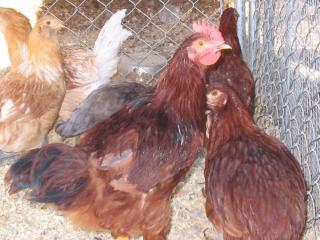Seriously.
 |
| Heritage breeds are important |
I was surprised at first to read about endangered domestic breeds. I picked up a book called Pocketful of Poultry and read how most of the breeds qualify as endangered or worse. When we think of endangered animals, we think of wild animals, but that's not always the case. The current food industry uses mostly one or two types of animals to produce food for most people. Using chickens as an example, the number one laying bird in the US is the white leghorn. For brown eggs, most industrial producers use ISA Browns -- a cross between New Hampshire Reds and Rhode Island Red. For meat chickens, producers use exclusively Plymouth Rock/ Cornish Crosses. As a result, breeds that were once commonplace are now rare and a huge percentage -- up to 50% -- of ancestral chicken genetics are gone for good.
This isn't just with chickens either. Throughout our agriculture, we're turning it into a monoculture that will have devastating results. Don't believe me? Take a page from history of more that 1 million dead Irish in the potato famine, the various rice famines and wheat crop failures. When you're dependent on one crop and if that crop fails, you'll begin to understand the need for diversity. What happens when we're limited to one or two types of animals or crops for food and disease hits it? Animals with more diverse genetics may be resistant to disease that one within a monoculture may be susceptible to. And do we really want to have only one or two breeds provide us food? It is a shame if we lose part of our agricultural history because it doesn't fit the current agriculture system.
So, how can you change this? Easily. Start buying heritage produce and grains. Learn where your meat and eggs comes from and buy from heritage herds and flocks. You can find this out by buying from farmer's markets and organic food stores. Start thinking about where your food comes from. Something as simple as that can change industry. If enough people care and request natural and heritage foods, that will cause the food industry to offer more variety. Look how popular organic and heritage foods are already. By simple changes in your buying habits you can help change the way agribusiness functions.
There's an interesting article about the subject of heritage breeds and genetic diversity.






![Thanksgiving Turkey Recipe -- Cider and Orange Turkey Brine [Recipe]](https://blogger.googleusercontent.com/img/b/R29vZ2xl/AVvXsEg-NN0qzj9e48aEwNBu040UqaxTGKK6LxyfNSaQHeyLymtUq3tL6MI8HO-nc07TEO3ZXmQUQyJ4AC3Z63IQ0DXmE498tiYwuIvA0Ncri-Mr60L4Sqfz3P0MIjc6VjnYpFrOu5lAw8rmAqw/w72-h72-p-k-no-nu/Thanksgiving+Recipe.jpg)
No comments:
Post a Comment